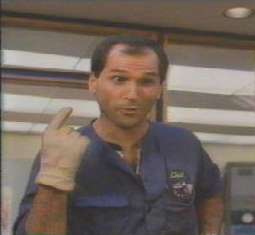 There’s a scene from the John Hughes/Brat Pack classic The Breakfast Club where John Bender (the “troubled rough kid” played by Judd Nelson) gets a lecture from Carl the Janitor (John Kapelos). John has just mocked his fellow classmates by suggesting that they should become purveyors of “the janitorial arts” like Carl. Carl makes a little speech about how he is really “the eyes and ears of this institution.” The camera cuts to a shot showing the reaction of the kids to his little monologue and we see, for just a split-second, a look of admiration on Judd Nelson’s face.
There’s a scene from the John Hughes/Brat Pack classic The Breakfast Club where John Bender (the “troubled rough kid” played by Judd Nelson) gets a lecture from Carl the Janitor (John Kapelos). John has just mocked his fellow classmates by suggesting that they should become purveyors of “the janitorial arts” like Carl. Carl makes a little speech about how he is really “the eyes and ears of this institution.” The camera cuts to a shot showing the reaction of the kids to his little monologue and we see, for just a split-second, a look of admiration on Judd Nelson’s face.
Or, at least, it seemed like a split-second back in 1985.
I had the opportunity to watch The Breakfast Club again recently on HBO. And I was shocked to find that that moment, which had seemed like the pinnacle of nuance and subtlety in filmmaking to my 14-year-old eyes, now seems anything but. The camera lingers on Judd Nelson’s face for-frickin’-ever.
So what happened to my intimate Breakfast Club moment? Did I misremember the scene? Was I simply caught up in the emotions of adolescence? (Let’s put it this way — I really identified with Michael Anthony Hall’s character, the dorky kid.) Can we simply write the whole thing off by saying “it was the ’80s”?
No, I think what really happened is that this scene from The Breakfast Club has become a victim of the cultural speedometer.
Our attention span is much shorter these days than it was in 1985. Quick film cuts that jarred our sensibilities back when Ronald Reagan was in the Oval Office feel slow as molasses now that George W. Bush is in the Oval Office. Our culture’s obsession with speed, speed, speed has pushed Hollywood directors to give us ever-quicker, ever-more-jarring editing techniques.
Watched any of those “wild, crazy, kinetically charged” music videos from the mid-’80s recently? Van Halen, Loverboy, Def Leppard? After two decades of Oliver Stone films, these relics from the early MTV era look hopelessly amateurish from a visual standpoint. (Never mind what two decades have done to the music.) The camera is either zooming endlessly in and out, or just wobbling around idiotically trying to create an impression of mayhem. Occasionally you’ll see shifts in the color palette timed to the beat of the music, which you can predict aeons before they occur.
Unfortunately, this obsession with speed has spilled over into other art forms as well. Of particular concern to me is how publishers expect books to be uniformly “fast-paced” these days. Get in the door, push, push, plot point, dialogue, bang, boom, climax! We’re done, on to the next book. Even if your novel is packing excess pounds, the worst thing you can do is write something that’s considered… slow.
Endless, wordy description? Slooooow. Lots of subtle character development? Slooooow. Taking hundreds of pages to make your point? Tooooo sloooooooooow.
Of course, rapid-fire artwork will always have its fans.But I’m generally not one of them. I prefer slow-paced works of art. Films and novels that take the time to build up character and background and subtext. Hand me a quick, afternoon-long, fast food burger of a book and I’ll gobble it down with the best of them — but hand me a door-stopping, generation-spanning, dictionary-requiring, month-devouring epic and watch me really smile.
If, like me, you’re not a fan of our society’s obsession with speed, take heart. Speed is a fad. The cultural speedometer will inevitably slow down.
Sometimes it seems like our cultural speedometer will just keep accelerating and accelerating until we reach the breaking point. We’ll be watching films that have nothing but split-second cuts from start to finish. Novels that zip from action scene to action scene every three pages.
But I predict the opposite. Human brains simply can’t take in that volume of information with that kind of rapidity unless they’ve been specially trained. I’m certain that our descendants are going to look on the hyperkinetic fast-paced style of the American popular arts as nothing but a curiosity.
And I’ll be able to enjoy The Breakfast Club again.